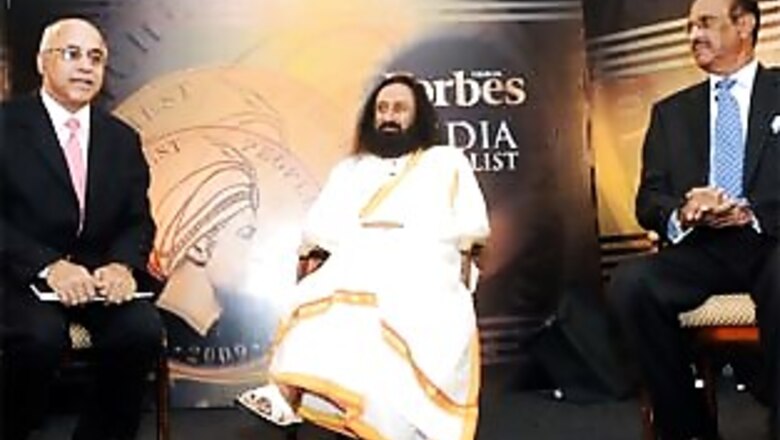
views
Subroto Bagchi: I have a personal question. When I was a little boy, my mother said that you have Lakshmi and you have Saraswati, two very pretty women, extremely jealous and she said that if I follow Lakshmi, then Saraswati will shun me and if I follow Saraswati, probably Laksmhi will follow at a distance.
Sri Sri Ravi Shankar: Today, there has been a truce
Subroto Bagchi: Thank you so much, that was really really wonderful, and I wish my mother was here to listen to that point.
The Goddess of Wealth might have made her truce with the Goddess of Learning. But Lakshmi is also the Goddess of Generosity and it seems her devotees have yet to fully learn that lesson.
As the Forbes India rich list shows, the number of Indian billionaires has gone up. Their wealth increased even as the recession took a toll on the economies of the richest countries. However, in a country where slums exist in the shadow of opulent high rises, the rich in India keep their purse strings tight.
This seemed to be the opportune moment to question the purpose of wealth. How much is enough? How does it feel to be rich in a land of poor? Can wisdom offer some solace?
To find answers to these questions, Forbes India brought two very different personalities on a single platform - one of the rich men on the list, G V Krishna Reddy (worth $1.07 billion) and spiritual guru Sri Sri Ravi Shankar.
"One, a worshipper of wealth and the other, in charge of salvation," as Subroto Bagchi, Mindtree's co-founder, Forbes India columnist and moderator of the discussion put it.
The differences were evident even as they arrived. Sri Sri Ravi Shankar walked in wearing a flowing white robe, smiling his trademark smile, followed by long-haired, Art of Living volunteers. Reddy, several inches taller than the guru, came in business formals, followed by similarly dressed colleagues
Following the discussion were the business elite in Bangalore - Bijou Kurien of Reliance Retail; Ashok Misra of Intellectual Ventures; Suresh C Senapaty of Wipro; Swati Ramanathan of Janaagraha; K K Narayanan of Meta-Helix; and Krishnakumar N of Mindtree.
Reddy narrated his rags-to-riches story. As a teenager, he said he was naughty and never interested in studies. But once he decided to do well in studies, he topped the class in a year. "My parents could not believe that for five years," he said. Later, when he wanted to build a five star hotel in Hyderabad, he was laughed at. When it turned out to be a success, he was praised. His recipe was simple - discipline and hard work.
Balance was Sri Sri Ravi Shankar's theme.
"There are different kinds of richness, some are rich in wisdom, some are rich in life, some are rich in both, some are rich in their enthusiasm and some are rich in their art and imagination, and some are rich in their bank balance," said the guru.
"If wealth leads to discomfort, the purpose is defeated," he said. The rich have expanded their business horizons into various philanthropic modules but a few have "yet to implement CSR [corporate social responsibility]".
"What is it to be a rich man in a poor country?" asked Bagchi.
Reddy said he did not feel rich. As a company, GVK does its bit for the society. It runs schools and hospitals. It is in the process of building houses for slum dwellers next to the Mumbai airport. And it runs the 108-Ambulance emergency ambulance service.
But, this and many such efforts have hardly addressed the basic issue of human suffering. Does it mean that spirituality with its promise of wisdom, love, compassion and salvation; and business with its own secular promises have failed?
"I won't say they have both failed. They both need more exposure and more growth and more co-ordinated growth," said Sri Sri Ravi Shankar.
The discussions struck a chord with the audience.
"We can't afford to be capitalistic like in the past, in a country like India where there is such a visible difference between rich and poor. Certainly if we don't have conscious capitalism, I don't think we'll prosper," said President and CEO – Lifestyle, Reliance Retail, Bijou Kurien.
An economist, Hans-Martin Schempp, echoed Sri Sri Ravi Shankar. "Richness really comes from giving. Like the law of agriculture, till you give away the seed then only will you see a harvest."
However, the bigger issues of poverty, suffering and inequality are yet to be resolved.
"It's not a question or answer that'll get answered in a lifetime. It is a millennial issue. In 4 million years neither poverty nor [the] spiritual depression has been solved in the world. So our job is to keep trying," Bagchi said later.

















Comments
0 comment